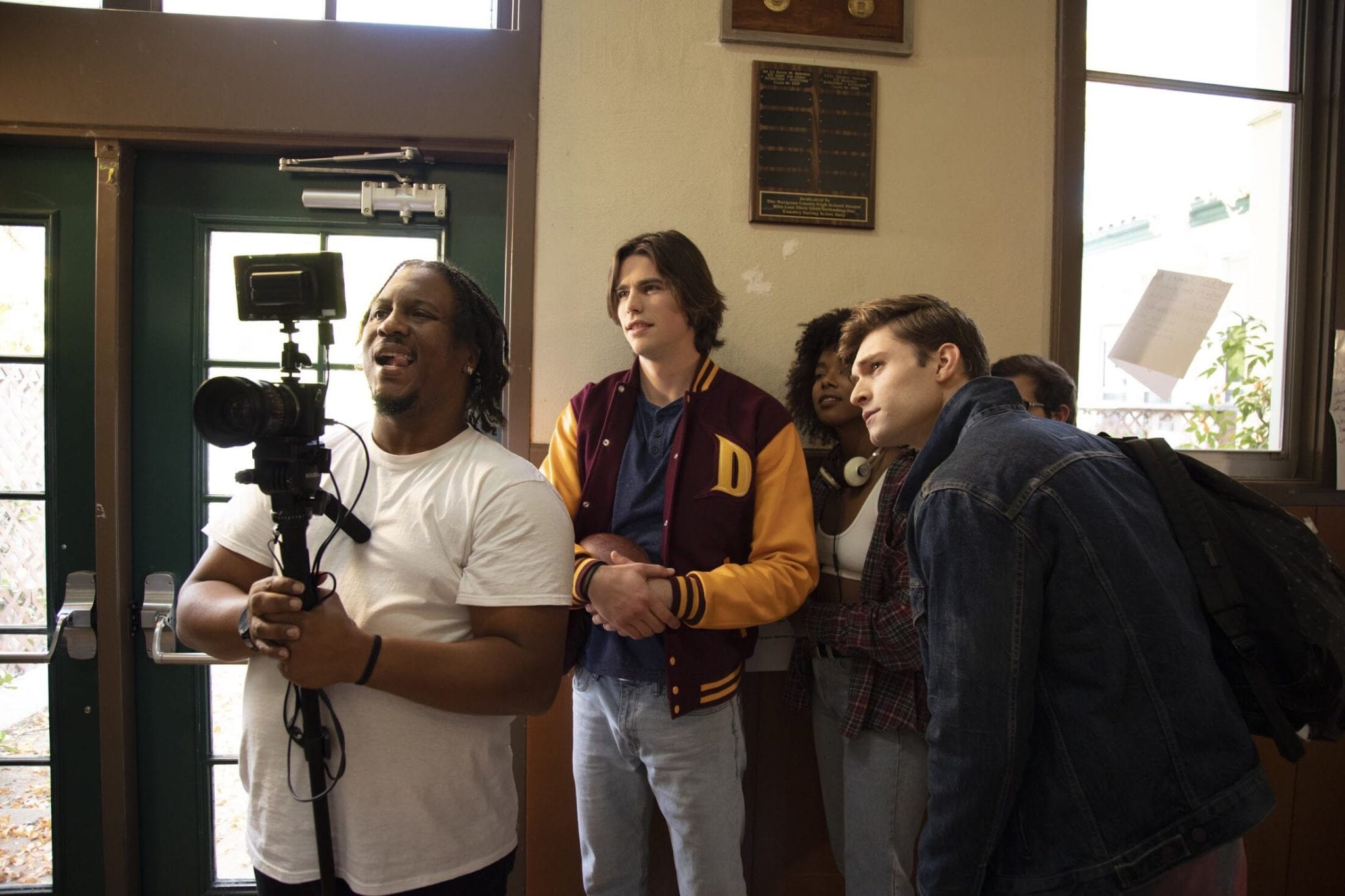In our current media sphere that so often focuses on either the actors, the director, a producer, or writers, it’s easy to lose sight of all the other people behind the scenes who help make your preferred television or digital shows, and movies, actually watchable. Perhaps one of the first lines of “make your pictures look good” is the cinematographer, and I recently had the opportunity to sit down with an up and coming man-of-all-trades, Lilton Stewart III to learn more about his path to Los Angeles.
When I meet Lilton, it’s at a regional theatre chain, on a Monday night. Lilton and I are standing at opposite ends of the theatre trying to spot each other, before finally making eye contact. He’s a warm, open man, quick with a smile and a laugh as we find a clean table to set up shop. Originally hailing from St. Louis, Lilton earned his media chops first through sound editing. Starting out as a rapper in 2008, he’d owned his own music studio before deciding to pursue his passion for film full time. Selling his business to fund his film school education from the Art Institute of St. Louis in 2012, Lilton took a deep dive into cinematography and never looked back.
However, first, he had to make the move across the country. “I was networking and sending my projects into film festivals and was getting traction from that. Some people put me on to a couple of societies out here, one of them being the American Society of Cinematographers (ASC), and I realized I wanted to really get into cinematography. So I got some money together to pay for a master class out here, came out and made a bunch of connections, and then started doing work. I’d fly out and do work and go back to St. Louis. The last time I flew out was January of this year, for the ASC awards, where Rachel Morrison (Black Panther, Mudbound) was nominated. My mentors told me ‘Hey if you really want to make this work, you gotta make the move.'”
Lilton took their advice. “At first it was just me, but then I couldn’t be away from my family for that long, so we had to make a plan for all of us to get out of here. At the end of April, we hopped in the car and road-tripped here.” I ask him how he and his family have adjusted to life on the west coast, and whether they’ve faced any difficulties in adapting to a new city. “It’s been a struggle, but not like it was in St. Louis. You know, St. Louis doesn’t have the market like LA. Most companies will outsource to studio production companies. They’d just have them do all of their stuff, so what work was left was almost all commercial and corporate training videos. Not a lot of narrative, and it wasn’t challenging. Being out here I get a lot of freedom with projects, and it’s been awesome.”
Still, Los Angeles sees thousands of would-be creatives flock to its city limits, from actors to writers to directors all hoping to make their mark. How does that journey differ when you’re making a career as a “crew” member? “Out here I’ve been blessed enough to be on the opposite side of ‘being an actor or a director,’ I think I’d be having a harder time. Cinematography is kind of a unique skill set, and there aren’t a lot of us. There are a lot of scammers out here, guys with cameras calling themselves cinematographers or DP’s, ripping people off who don’t know. You get a lot of newer actors coming out here and getting ripped off, because they don’t know what the costs are, or the technical breakdowns of a shoot. I hate that type of hustle, like photographers you see who shoot their clients in “auto” instead of manual because the client doesn’t know any better. I try to show everyone the same type of integrity I would want to be shown on set.”
As far as networking goes, Lilton has found his hustle in forming relationships. “For me, it’s been a lot of word of mouth; I’ll work with one person who recommends me to another person. I try to go for people who I feel I could call family later on. I’m real personal, I’m kind of a goofball, so I like to work with people who I can have fun with. It’s a blessing to be able to do something like this.”
I ask him about the type of equipment he’ll use, the many different cameras on the market, and how he approaches his tools. “I had a situation where there was someone who didn’t know what they were doing with a professional camera, and it looked like they were shooting from a Wal-Mart Canon T3i. They didn’t understand the color science of the camera, or what the manufacturer was looking for when they made the camera. They’re all tools. But the tools are only as good as the brain behind it. You know, I have a cinematographer’s bible, and I go back and read through it to refresh myself. I may shoot with an A6500 SONY, but I’d call SONY up and ask for a diagnostic spec of the camera’s sensor. I’d make sure I know how to get the best out of that camera, and where my boundaries are, and what I can and can’t do with it.”

It reminds me of the award-winning indie film, Tangerine, which was famously shot using an iPhone camera. Lilton smiles and nods, saying “It’s the perfect example of someone knowing how to use the tool they had.”
When asked about his filming techniques, he describes his approach that he’s dubbed as “method cinematography.” “I want to be invested in whatever I’m shooting. Everything the camera does is just another way of telling the story. Everything has to make sense, why are you taking those shots? I want to be loose and get into the same energy the actor is in. I need to feel what’s going on, and what’s happening.”
As our interview progresses, I ask him what he’s noticed working in the entertainment industry as a Black man, and where he thinks the needle is moving for progress as far as diversity behind the cameras is going. “The biggest struggle I think I have, and this started back in St. Louis, is people trying to take advantage of my worth. They think you don’t know, when they look at you like ‘Oh, he’s a Black guy trying to do this, that’s cute, we’re going to do him a favor by letting him shoot our stuff,’ as opposed it to be mutual respect for each other. Or people assuming that because I’m Black I should be doing only “Black” projects. I always have to prove myself to everyone I meet. They might look at me like “you don’t look like you know what you’re talking about,” but then they’ll see my work and say ‘Oh, you’re actually a DP!’, you know?”
In his personal workspaces, Lilton says he’s fortunate enough to be working with diverse crews. In fact, one of his current projects has nearly an all women crew. “It’s a melting pot! I’m loving it!”
Speaking of current projects, there’s one, in particular, he’s very excited about — a television story idea called Dredgewood. “It’s a straightforward approach to a horror story, dealing with Native American folklore in a small town. I describe it like Stranger Things with actual lore instead of made up monsters. We’ve got a letter of intent, a great cast, and we just came back from shooting the teaser trailer, we’re getting to pitch to Netflix. I’m just really, really psyched for it.”
But that doesn’t mean he’s not working on projects of his own. Currently, he’s in the process of refining a script of his own creation. This leads me to ask him just how many skillsets he has. “Cinematography is my skill, but directing is my passion. I can do my own editing, too. I have all of this background in sound because I was a studio engineer with my recording studio. I can create sounds, I know Foley work, I have a trade in business technology and management, I can do graphic design. I can make music and compose music, and I can do these with fast turnarounds. All of my life feels like it’s been training for this. You know, if I can’t do it at 100%, I won’t do it. I’ll let my work speak for itself.”
So ultimately, what’s the dream for a man who seems to be a master at all trades? “I want to be one of the first writer/director/DP/editors. Make my own projects and fully be in it from beginning to end. You know, daydream here, make a movie and be nominated for both directing and cinematography and editing. I want to push the industry forward. I don’t want to pass the bar, I want to be the bar.”


